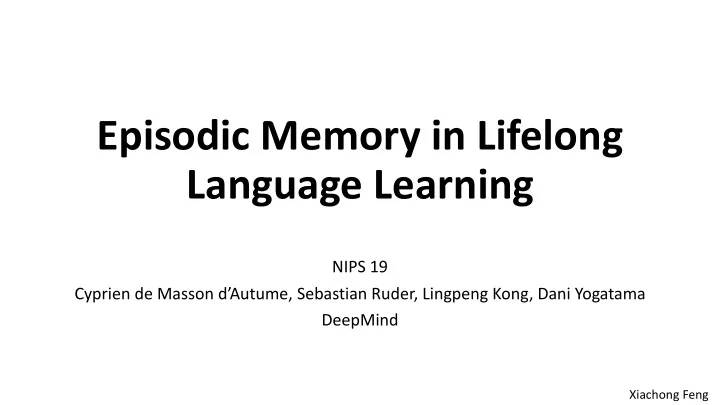

Episodic Memory in Lifelong Language Learning NIPS 19 Cyprien de Masson d’Autume, Sebastian Ruder, Lingpeng Kong, Dani Yogatama DeepMind Xiachong Feng
Outline • Author • Background • Task • Model • Experiment • Result
Author Lingpeng Kong Cyprien de Masson Sebastian Ruder Dani Yogatama (孔令鹏) d’Autume DeepMind DeepMind DeepMind
Background • Life long learning
Background • Catastrophic Forgetting
Task • Text classification • Question answering
Model • Example encoder • Task decoder • Episodic memory module.
Example encoder && Task decoder
• Text classification, 𝒚 𝒖 is a document to be Episodic Memory classified • Question answering, 𝒚 𝒖 is a concatenation of a context paragraph and a question separated by [SEP]. • key-value memory block Label key value • Text Classification • [CLS] • Question Answering • The first token of question Pretrained BERT Model (freeze)
Episodic Memory Sparse experience replay Local adaptation Episodic Memory Model
Model - Training • Write • Based on random write • Read sparse experience replay • Uniformly random sampling • Perform gradient updates based on the retrieved examples • Sparsely : randomly retrieve 100 examples every 10,000 new examples
Model - Inference • Read local adaptation • Key net à query vector • K-nearest neighbors using the Euclidean distance function 1 𝐿
Experiments • Text classification • News classification (AGNews), sentiment analysis (Yelp, Amazon), Wikipedia article classification (DBPedia), and questions and answers categorization (Yahoo). • AGNews (4 classes), Yelp (5 classes), DBPedia (14 classes), Amazon (5 classes), and Yahoo (10 classes) datasets. • Yelp and Amazon datasets have similar semantics (product ratings), we merge the classes for these two datasets. • Question answering • SQuAD 1.1 ,TriviaQA, QuAC • Create a balanced version all datasets
QA Text classification Results randomly retrieved examples for local adaptation multitask model
Result
Result store only 50% and 10% of training examples.
Result
Thanks!
Recommend
More recommend